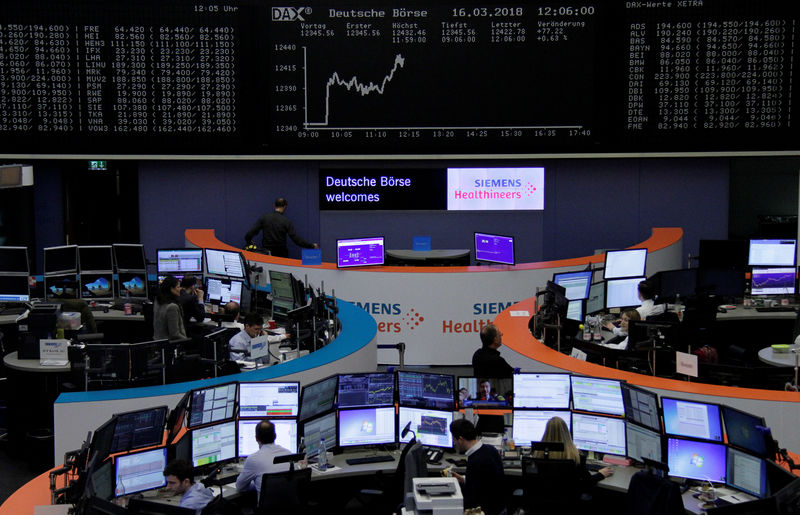Novo Nordisk, Eli Lilly fall after Trump comments on weight loss drug pricing
By Julie Zhu
HONG KONG, March 2 (Reuters) - Asia stocks dropped on
Tuesday and European equity futures fell as a senior Chinese
official expressed wariness about the risk of asset bubbles in
foreign markets and a recent bond market sell-off still weighed
on investor sentiment.
European markets appeared set for a lower open with Euro
Stoxx 50 futures STXEc1 down 0.38% and London's FTSE FFIc1
dropping 0.4%. Those of Germany's DAX FDXc1 fell 0.49%.
MSCI's broadest index of Asia-Pacific shares outside Japan
slipped 0.33%, giving up early gains. Japan's Nikkei .N225 was
down 0.85% as some investors booked profits on defensive energy
and utility shares before the end of the fiscal year this month.
Australian shares ended marginally lower on Tuesday as the
market appeared to show a muted response towards the central
bank's decision to stand pat on interest rates, as expected.
L3N2L01EP
The S&P/ASX 200 index .AXJO fell 0.4% to 6,762.3 at the
close of trade, having risen as much as 1% during the session.
Shares in mainland China and Hong Kong reversed course to
trade lower in the afternoon session after a top regulatory
official expressed concerns about the risk of bubbles bursting
in foreign markets, and said Beijing is studying effective
measures to manage capital inflows to prevent turbulence in the
domestic market. "Financial markets are trading at high levels in Europe, the
U.S. and other developed countries, which runs counter to the
real economy," Guo Shuqing, head of the China Banking and
Insurance Regulatory Commission, told a news conference.
Chinese blue-chips .CSI300 dipped 1.78% while Hong Kong's
Hang Seng .HSI lost 1.45%.
Investors now eye China's annual session of parliament
beginning on Friday, which is expected to chart a course for
economic recovery and unveil a five-year plan to fend off
stagnation. U.S. stocks .N rallied overnight, with the S&P 500 .SPX
posting its best day in nearly nine months, as bond markets
calmed after a month-long selloff.
"Risk appetite returned to markets as investors shook off
worries of higher interest rates and focused on the recent
strength in the manufacturing data," wrote ANZ analysts in a
research note.
U.S. stocks were roiled last week when a sell-off in
Treasuries pushed the 10-year Treasury yield US10YT=RR to a
one-year high of 1.614%. The 10-year yield was edging lower in
after trade at 1.4119%. US/
Bitcoin BTC=BTSP fell 1.93% to $48,669 after rising nearly
7% on Monday after last week's bond rout cooled, with Citi
saying the most popular cryptocurrency was at a "tipping point"
and could become the preferred currency for international trade.
However, demand for riskier assets did not slug the dollar,
usually regarded as a safe-haven currency, as investors bet on
fast growth and inflation in the United States. The U.S. dollar
index =USD gained 0.207% in afternoon trade against a basket
of currencies to stand at 91.205, within sight of a three-week
high hit overnight. USD/
The Australian dollar AUD= was down 0.14% at $0.7758 after
the RBA meeting.
A stronger greenback weighed on gold XAU= , and the
precious metal was on the defensive at $1,715.8400 an ounce on
Tuesday. GOL/
The exuberance in risk assets did not help energy markets.
Oil prices fell more than 1% overnight after data showed China's
factory activity growth slipped to a nine-month low in February,
owing in part to disruptions over the Lunar New Year holiday.
There were also fears among energy investors that OPEC may
increase global supply following a meeting this week. O/R
Brent crude LCOc1 fell 1.35% to $62.83 a barrel, while
U.S. West Texas Intermediate crude CLc1 lost 1.34% to $59.83.
<^^^^^^^^^^^^^^^^^^^^^^^^^^^^^^^^^^^^^^^^^^^^^^^^^^^^^^^^^^^
Global assets http://tmsnrt.rs/2jvdmXl
Global currencies vs. dollar http://tmsnrt.rs/2egbfVh
Emerging markets http://tmsnrt.rs/2ihRugV
MSCI All Country World Index Market Cap http://tmsnrt.rs/2EmTD6j
^^^^^^^^^^^^^^^^^^^^^^^^^^^^^^^^^^^^^^^^^^^^^^^^^^^^^^^^^^^>
